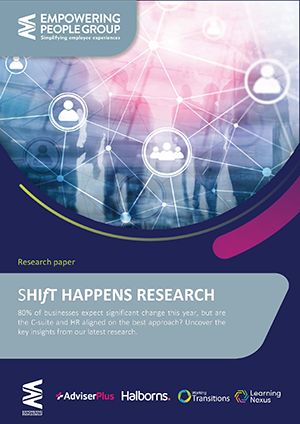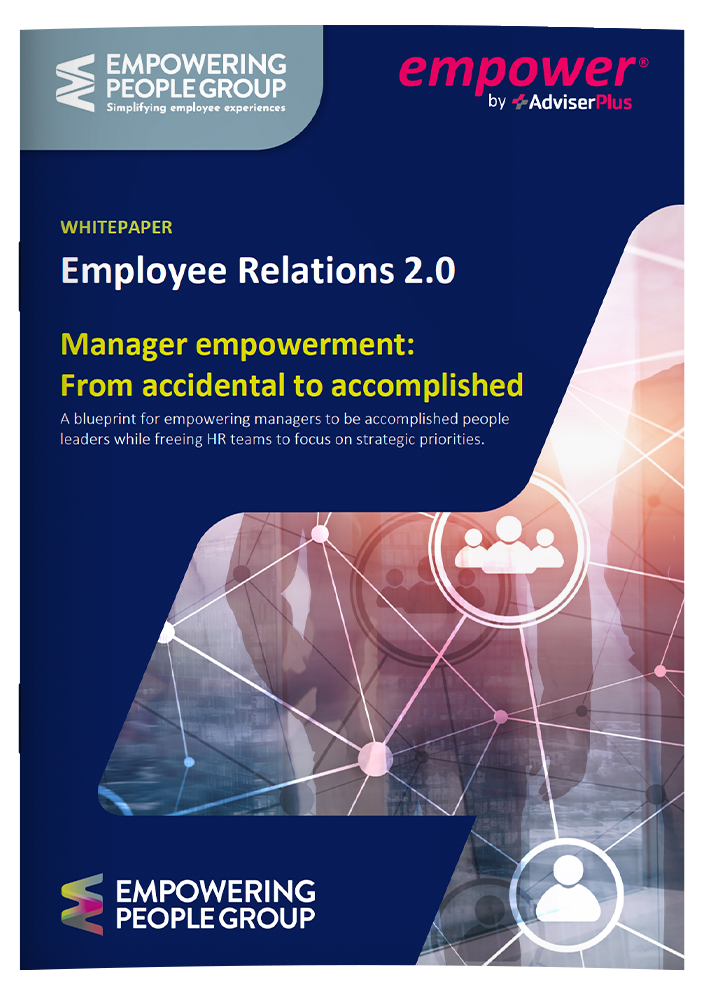Manager capability: The key to navigating large-scale change in 2025
Change has become the rhythm of business today, requiring leaders to embrace clarity, adaptability and a forward-thinking mindset. With evolving legislation like the Employment Rights Bill, and challenges such as downsizing and tighter budgets, businesses face growing complexity and uncertainty.
Organisations are counting on capable line managers to navigate change compassionately, inspire teams and implement effective strategies. But here’s the crucial question: Are your people managers prepared for what lies ahead? Now more than ever, your managers need to be equipped to tackle the inevitable challenges of 2025 and lead with confidence, compliance and success.
Organisational change in 2025: What managers should expect
Line managers are on the frontlines of change, facing challenges such as new regulations, economic pressures and workforce shifts. Here are some of the key challenges they will face in 2025:
Balancing budget and operational efficiencies
 Our ‘Shift happens‘ research shows that over 80% of participating organisations anticipate significant changes, such as restructuring and redundancies. These challenges will intensify with tighter budgets and higher expectations from employees.
Our ‘Shift happens‘ research shows that over 80% of participating organisations anticipate significant changes, such as restructuring and redundancies. These challenges will intensify with tighter budgets and higher expectations from employees.
Line managers will play a critical role in helping people teams drive success with these constraints. Achieving this balance requires clear strategies and the right support systems.
Redundancy and workforce restructuring
As of January 20th 2025, stricter consultation requirements have impacted redundancy processes, and the potential removal of the ‘at one establishment’ condition within the Employment Rights Bill demands a legally sound and empathetic approach to redundancy procedures. For further insights, explore our blog: 81% of large enterprises predict redundancies.
Regulatory change and compliance
Managers must be equipped to adapt to evolving regulations, including collective consultation rules, rights for flexible workers and stricter sexual harassment duties. Non-compliance carries risks of severe legal and reputational damage.
To stay compliant, explore our resources:
- Preventing sexual harassment: A new legal duty – Checklist
- Preventing sexual harassment: A new legal duty – Your questions answered
- Navigating the new era of HR – Blog
The Employment Rights Bill may also introduce stricter dismissal procedures and probationary assessments, requiring managers to handle processes with confidence and precision. These changes could demand 13% more employee relations (ER) advisory resources to support managers.
Simplifying employee relations
Effective employee relations (ER) management is crucial for driving positive change, improving compliance and enhancing employee experiences. Yet, line managers often escalate personnel matters to overstretched HR teams.
Without the right tools and trust in managers, risks arise: prolonged ER case resolutions, dissatisfied employees and legal exposure. Relying on email chains, spreadsheets and ticketing systems only increase inefficiencies, making ER case management complex and resource-intensive.
Technological change
Technological advancements present both opportunities and challenges for organisations, but tailored solutions are essential to meet industry-specific needs. Off-the-shelf systems often fall short, resulting in inefficiencies and missed potential.
ER case management exemplifies this. For example, without a robust ER case management system, managers overwhelm HR with routine issues, taking their focus away from strategic initiatives. While AI and HR systems hold significant promise, generic systems fail to provide the people-centric support organisations and line managers need.
Building diverse and inclusive teams
Supporting diversity is critical for attracting and retaining talent. Whether supporting neurodiverse employees, hybrid teams, or individuals from varied cultural backgrounds, inclusive leadership is essential as organisations prepare for potential workforce shifts – especially with the looming threat of a ‘Great Resignation 2.0‘.
Well-being and burnout
Addressing well-being and burnout is another challenge of managers, with People Management magazine citing 1 in 4 employees considering leaving their jobs. Prioritising mental health and well-being is crucial for improving job satisfaction, career development and team inclusivity.
Managers must balance all of these responsibilities while maintaining team productivity and morale during large-scale change – an increasingly complex task.
Empowering managers drives HR transformation
Proactively developing managerial capabilities is vital for successfully navigating 2025’s workplace challenges. The result? A transformative impact on your business, including HR transformation.
Reduce HR’s operational burden
Empowered managers can self-serve routine tasks like performance management and low-risk disciplinary actions confidently and in a risk-managed way, freeing HR to focus on strategic priorities.
The empower® ER case management system demonstrated this in 2024, where line managers using the system resolved 5 in 8 ER cases without HR intervention. This allows HR to direct their specialist resources toward talent development, organisational growth and large-scale change projects.
Cost savings through risk mitigation
Skilled managers reduce the risk of issues accelerating into costly tribunal claims and high employee turnover. For instance, Wickes achieved a 50% reduction in tribunal claims by prioritising manager empowerment and transforming employee relations.
For more on ROI, read our whitepaper: Employee relations 2.0: Overcoming the investment gap to drive an ROI revolution.
Better data and people insights
Advanced people analytics tools integrated into the empower® ER case management system allow HR to monitor ER case trends with user-friendly dashboards and real-time management information. These insights drive informed decision-making and align HR initiatives with business goals.
Transform employee relations
When managers effectively manage day-to-day employee matters and escalate only complex issues to HR, they strengthen organisational stability. This approach creates a resilient and adaptable workforce.
By freeing HR teams from handling low-risk employee relations cases, they can dedicate more time to addressing complex challenges, such as grievances, and driving strategic initiatives like workforce planning and employee engagement.
Why investing in manager capability is non-negotiable

Change management has emerged as one of the most critical leadership skills to develop in 2025, as highlighted by Forbes. When you consider that our ‘From accidental to accomplished leaders’ whitepaper reveals a concerning reality that many managers already feel overwhelmed with their current responsibilities, with insufficient managerial capability a barrier to HR transformation, acting now is essential.
Without adequate resources to develop essential skills and manager capabilities, organisations risk low morale, reduced productivity and compliance challenges, which can disrupt both daily operations and long-term goals.
Build a resilient management team: Get in touch today
Don’t let gaps in manager capability stall your organisation’s progress. Build a resilient, capable management team to face 2025’s challenges with confidence and agility.
Ready to lead the way? Contact us today or explore our employee relations transformation case studies to discover the transformative impact of empowering your managers.